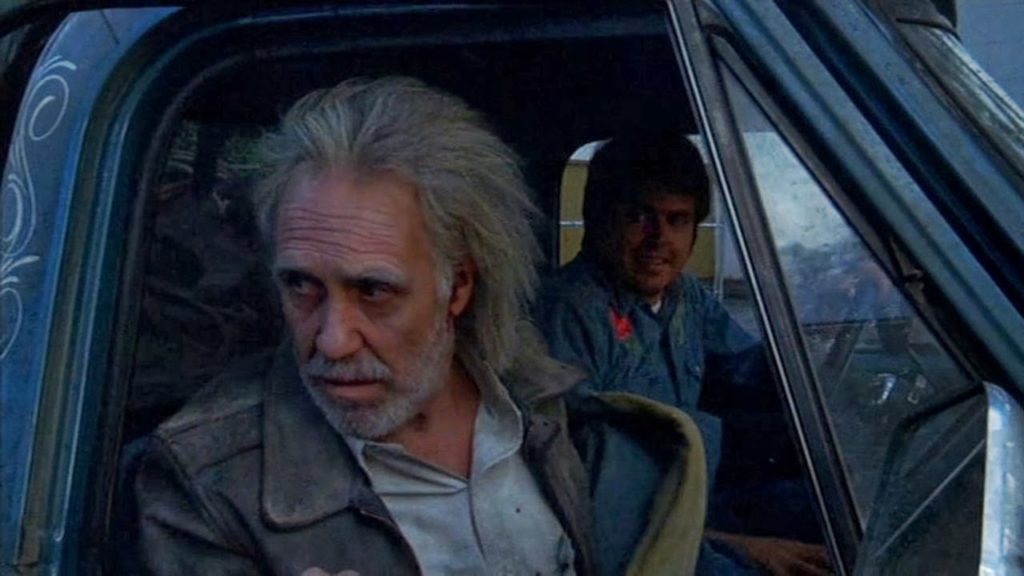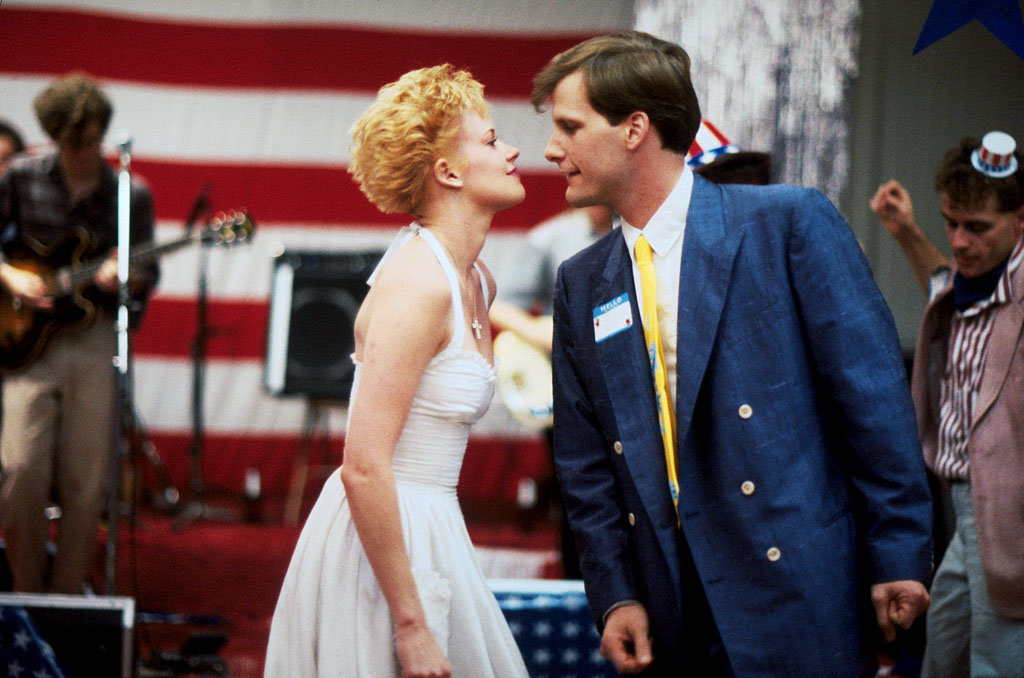Reviews include 40 Acres, Jurassic World: Rebirth, and Sorry, Baby.
In Memoriam: Jonathan Demme
May 1, 2017
Jonathan Demme didn’t set out to be a director.
He stumbled into the industry through screenwriting and publicity, eventually landing in Roger Corman’s exploitation movie factory in the 1970s. Like Francis Ford Coppola, Martin Scorsese, James Cameron, Joe Dante, and so many others, Demme learned to direct on the job, cranking out drive-in fodder for Corman. In later years he’d cheerily dismiss the women-in-prison caper Caged Heat, the crime-spree comedy Crazy Mama, and the politicized revenge thriller Frighting Mad as public film school experiments.

Yet within those lurid cheapies a singular voice emerged: One that championed the underdog, wrote with a social conscience, experimented with cinema’s visual language, and did it all within a package that was pleasingly entertaining even to viewers unconcerned with subtext and technique. In some ways he never stopped making Roger Corman movies—especially when it came to the one that won him an Oscar.
Though he made movies that became iconic, won awards, and lit up box office tallies, Demme somehow always seemed underrated. Part of that was his unassuming nature: He never took too much credit for his work; he never wanted to make himself the star. He dabbled in a variety of genres, made documentaries to compliment his fiction, worked in television, helmed music videos, and tried virtually everything else possible in the audio/visual medium. What connected them all (beyond impeccable craft) was the filmmaker’s deep empathy for the human condition. He loved people and there was rarely a character within his frames who didn’t seem worthy of a movie unto themselves. After all, this was a man who made the world fall in love with Hannibal Lector on Valentine’s Day in 1991. (Who else could pull that off?)
Demme’s first Hollywood outings came with struggle. He created a Hitchcock homage with an unfinished script that was essentially a sublimely hollow exercise in technique in The Last Embrace. More importantly he developed a comedic voice through a pair of American fables defined by an acute sense of human behaviour and an adoration for country kitsch. Citizen’s Band (aka Handle With Care) was a loving ode to CB radio fantasies: filled with adorable eccentrics that was never fully supported by its studio in 1977, and remains criminally impossible to find to this day. His first masterpiece was 1980’s Melvin And Howard. Ostensibly a stranger-than-fiction true life comedy about a milkman who was left a substantial portion of Howard Hughes’ will, the film was an exploration and celebration of the messy diversions, failed dreams, and accidental bliss that defines most lives. It was filmed with passion, empathy, and with an eye for the beauty found in the mundane moments of existence. It won Oscars and elevated Demme within the studio system. It remains a cult favourite.

Melvin And Howard’s success earned Demme his biggest and most ambitious feature to date in Swing Shift. It was supposed to be a feminist celebration of the women who worked in factories during World War II, but the studio and his stars demanded reshoots that diluted the film into a disposable romantic comedy. Swing Shift was a low point in Demme’s career, but like the plot of so many of movies, that failure was just a diversion to bliss. While struggling with Swing Shift reshoots during the day, Demme shot the Talking Heads concert movie Stop Making Sense at night. The side project would become arguably the finest concert film ever produced. Removing all shots of the audience and backstage interviews from the concert movie format, Demme focused exclusively on the live performance. His cameras danced with band, transforming every song into a live music video and turning each band member into a momentary star of an eccentric ensemble. It’s a beautiful movie—and every time it screens theatrically (which it continues to do), audiences dance in the aisles. Few films of any kind capture the power of music so profoundly.
Music was a vital component of Demme’s cinematic voice. He’d make many more concert movies: Three for Neil Young alone (Heart Of Gold, Trunk Show, and Journeys), one for an underrated cult performer Robyn Hitchcock (Storefront Hitchcock), and a Netflix / Justin Timberlake (Justin Timberlake + The Tennessee Kids) extravaganza that would, sadly, become his final film. He also shot a handful of music videos over his career and filled his movies with cameos from musician friends. Music was also central to the fiction films he made, with each soundtrack playing like an adoring mixtape gift to the movie going public, synced up perfectly with his eccentric narratives. The partnership with Talking Heads front man David Byrne continued through the soundtracks of Demme’s two great crime comedies in the 1980s. Bryne provided the soundtrack for Married To The Mob, a pure entertainment lark from Demme that practically invented American indie quirk comedy and did it better than most that followed. Byrne also wrote the title track for what might be Demme’s masterpiece: Something Wild.

The 1986 yuppie panic comedy with Jeff Daniels and Melanie Griffith was both a playfully comedic thriller and a love letter to the movies from Jonathan Demme. Filled with wild tonal shifts, candy coloured cinematography, fascinatingly bizarre supporting characters, magical thrift store production design, and a masterful soundtrack that was practically a character, Something Wild is a perfect confection of cinematic entertainment. Demme slid in some personal messages about embracing life over dying for economic success, but mostly embraced pure cinema and cemented his style: defined by colourful set pieces, bracing close-ups, subjective camerawork, and images of actors starring directly into his loving lens.
That aesthetic was perfected in The Silence Of The Lambs, a film that was an odd genre-bender of police procedural and serial killer horror on release—now a genre unto itself in the age of CSI. Demme’s incomparable love of his characters made Hannibal Lector a pop icon, turned FBI trainee Clarice Starling into a feminist hero, and somehow even empathized with the brutal Buffalo Bill. The Silence Of The Lambs smashed through pop culture like few movies ever can, giving Demme the box office hit that had long eluded him throughout his career to that point and a richly deserved Academy Award. The film also afforded him the commercial clout to make the socially-conscious dramas that he’d always dreamed of.

First came Philadelphia, which brought AIDS and gay discrimination to Hollywood. It came in part as an apology for the accusations of homophobia dropped on The Silence Of The Lambs, and while Demme’s determination to reach suburban mall audiences uncomfortable with the idea of homosexuality in the 1990s makes it feel dated nowadays, the film carries an emotional weight that’s impossible to deny. Later, Demme collaborated with Oprah Winfrey for an epic horror story about slavery adapted from Toni Morrison’s Beloved in his only other feature of the 1990s. It bombed at the time and is forgotten now, yet Demme and Oprah used their status to make a complicated art film about an immensely difficult subject that desperately deserves rediscovery. Demme also focused his passion for social justice in a side career of documentaries, including several about Haiti (The Agronomist, Haiti Dreams of Democracy), one about Jimmy Carter (Jimmy Carter: Man From Plains), another about a remarkable Hurricane Katrina survivor (I’m Carolyn Parker), and a highly personal feature about his preacher/activist relative (Cousin Bobby). Though Demme’s docs are difficult to find and understandably overshadowed by his fiction films, they showcase the filmmaker’s deep empathy for the human condition like few other entries in his filmography.
The 2000s weren’t the greatest era for Demme as a director. His final fiction features were a cute character comedy (Ricki And The Flash) and a peculiarly painful adaptation of a Henrik Ibsen play about death (A Master Builder) that was perhaps a little too unforgiving. Far more fun were a pair of remakes in the early 2000s that Demme filled with his personal passions. The Charade reboot The Truth About Charlie overcame some miscasting for a feature length homage to French New Wave cinematic experimentation with a studio budget, while his update of The Manchurian Candidate refocused the paranoid political satire on the relationship between corporations and American politics that has only gotten more relevant during the insanity of the current administration. Yet between all these minor efforts came Demme’s final masterpiece: Rachel Getting Married. The tale of family bonding and addiction alienation showcased the filmmaker at the peak of his powers. Culturally inclusive, deeply empathetic, inspirationally collaborative, unexpectedly hilarious, richly moving, impeccably acted, and so, so raw, Rachel Getting Married showcased what Demme was capable of when unburdened by studio constraints and genre limitations. That he didn’t get to do that dance again is a shame, but still: Demme never made a bad movie. He simply rarely got the freedom to make a purely Jonathan Demme movie after the 1990s.

The filmography that Jonathan Demme leaves behind is more rich and diverse than most directors would dare dream of producing. None of them are without moments of interest and several are endlessly rewatchable. He was a remarkable artist. Yet as the stream of memorials that came from celebrity friends over the past week proved, the love, empathy, and sense of inclusivity that Demme shared in his work came directly from the man. No co-worker or collaborator ever uttered a harsh word about Demme during his four-decade career, which can be said of precious few in the film industry. He was a great person as much as he was a great artist, and the way he put viewers inside the eyes of his characters and forced audiences to embrace new perspectives and ideals is something that cinema desperately needs more of. The director with the biggest heart in Hollywood leaves behind a hole in the industry that desperately needs to be filled. He will be missed. Yet thanks to the incomparable collection of films that he left behind, Jonathan Demme will never be forgotten. RIP.



